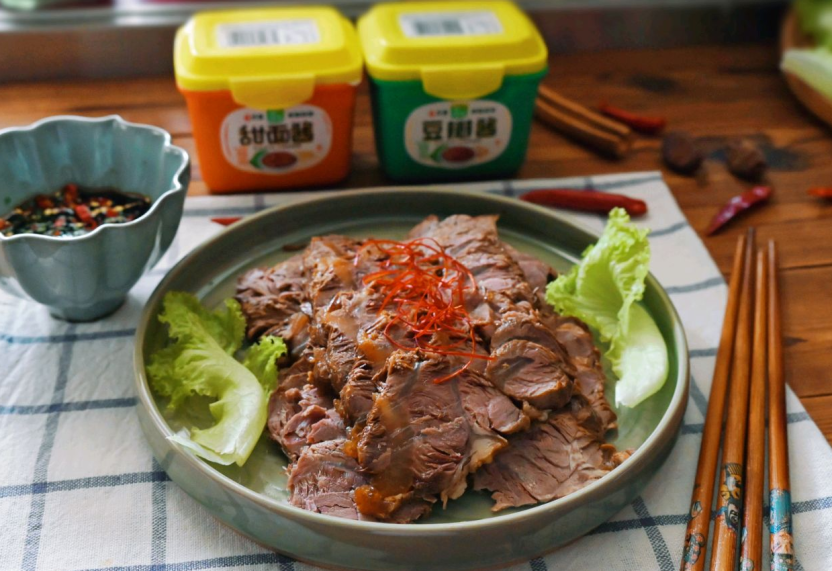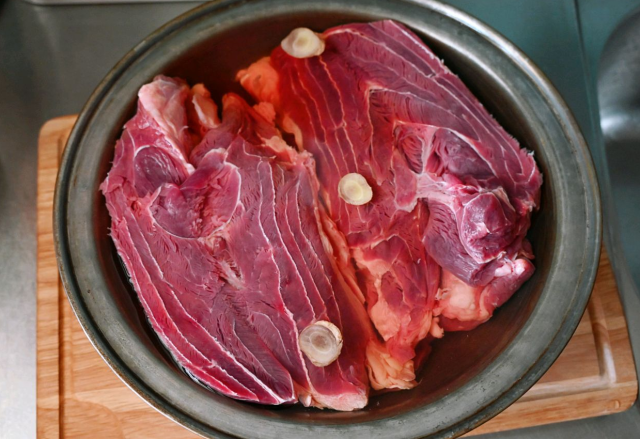Braised Beef Shank Recipe
Beef is one of the most popular meats, known for its high nutritional value and delicious taste, despite being slightly more expensive. When it comes to the most delicious cut, beef shank is highly regarded. It has a firm texture with meat marbled throughout the tendons, making it perfect for Braised Beef Shank, which is incredibly tasty and commonly enjoyed at dining tables by people of all ages.

 20 Comments
20 Comments
Braised Beef Shank is a delicious and popular home-cooked dish known for its tender texture and flavorful, spicy taste. However, achieving a well-seasoned and tasty Braised Beef Shank at home can be challenging. Today, I'll share some tips for making Braised Beef Shank that will help you easily create a delicious dish in your own kitchen.
1.what is Braised Beef Shank?
Braised Beef Shank, originating from Hohhot, Inner Mongolia, in the mid-Qing Dynasty, was created by Liu Lu, a Hui ethnic entrepreneur from Cangzhou, Hebei province. Initially sold from a cart in Hohhot, it later became a specialty at his shop "Wanshengyong." Liu Lu's meticulous ingredient selection and unique seasoning methods imparted a distinctive flavor to Braised Beef Shank, known for its rich and robust taste, gaining nationwide fame by the late Qing Dynasty.
2.What is Beef Shank?
Beef shank refers to the meat from the leg of a cow, specifically the tendons located in either the front or hind legs. This part of the cow tends to be firm and has a distinct texture due to the frequent use of the leg muscles. Beef shank is suitable for cooking methods such as braising, stewing, and simmering. Generally, fresh beef shank with a vibrant red color and no off-putting odor is preferred for cooking.
At the same time, fresh beef shank meat should be marinated before cooking to better preserve its tender texture and enhance its flavor.
3.What are some of the braising spices?
Star Anise: Commonly known as "ba jiao," it's the fruit of the star anise tree in the magnolia family. The deep brown fruit is star-shaped and widely used in everyday cooking. It has a sweet and slightly licorice-like flavor.
Cinnamon: Also known as "xiang gui" or "rou gui," it's the second most commonly used spice in cooking after star anise. Often paired with star anise, cinnamon is used in cooking meats to eliminate odors and reduce greasiness.
Nutmeg: It's a spice closely associated with cooking meats, known for its ability to eliminate odors.
Bay Leaf: Bay leaf, also known as laurel leaf or bay laurel, is a commonly used seasoning in the kitchen. It's primarily used to enhance the aroma of food.
Clove: Clove is a strongly aromatic spice known for its penetrating fragrance. It helps to remove gamey odors and enhances the flavor of meat, reducing its greasiness.
Black cardamom: Black cardamom is a type of aromatic spice with a distinct strong and spicy flavor, commonly used in the preparation of meat dishes.
Cumin: Cumin is a unique spice known for its strong and pungent aroma, used to remove gamey flavors and enhance the overall fragrance of food.
Above spices are commonly used seasonings in Chinese cuisine, typically available in Asian supermarkets or online.
4.How long does it need to stew?
Braised Beef Shank needs to stew for about 2 hour. During the stewing process, it's important to stir the beef occasionally to ensure even heating and allow the flavors of the seasonings to penetrate the beef. The stewing time can be adjusted according to personal preference; if you prefer the beef to be more tender, you can extend the stewing time accordingly.
5.How to Enjoy Braised Beef Shank?
①After cooking, simply serve the braised beef shank with some of the stewing broth. The meat is incredibly tender and pairs perfectly with steamed rice.
②You can use Braised Beef Shank as an ingredient, use the stewing broth as the soup base, and serve it with noodles for a delicious dish.
③ It can be enjoyed as a cold dish. You can prepare a dipping sauce and pair Braised Beef Shank with it for a tasty combination.
With these tips, everyone should be able to quickly make an authentic Braised Beef Shank. You can also adjust the seasoning and add different ingredients according to your taste preferences. Now, let's get started together!
INGREDIENTS
MAIN INGREDIENTS
- 2000g beef shank
SEASONINGS
- 50g light soy sauce
- 20g rock sugar
- 20g cinnamon sticks
- 2g bay leaves
- 5g cardamom
- 3g cloves
- 50g dark soy sauce
- 40g cooking wine
- 5g star anise
- 5g Black cardamom
- 3g cumin seeds
- 10g dried chili peppers
- 15g ginger
DIRECTIONS
STEP 1
Slice 15g of ginger. Place 2000g of beef shank into a basin of cold water, add 5g of ginger and 20g of cooking wine, soak for 30 minutes to initially remove blood.

STEP 2
Cut the beef shank into roughly 8 large pieces of similar size, and prepare the ingredients.

STEP 3
Place the prepared beef shank into a pot of cold water. Add 10g of ginger and 20g of cooking wine. Bring to a boil over medium heat and cook for 10 minutes until the beef changes color and no longer releases blood.

STEP 4
Take a bowl and add 25g of sweet bean sauce and 25g of fermented bean paste.

STEP 5
In another pot, add 2500ml of water. Place all the spices (20g cinnamon sticks, 2g bay leaves, 3g cloves, 5g Black cardamom, 3g cumin seeds, 5g cardamom, 5g star anise, enclosed in a tea bag), along with 20g of rock sugar and 10g of dried chili peppers. Pour in the fermented bean paste and sweet bean sauce mixture (25g each), along with 50g of dark soy sauce and light soy sauce. Bring to a boil.

STEP 6
Add the blanched beef shank into the pot, cover with a lid, and simmer over low heat for 2 hours.
Tip:
I prefer my beef very tender, so adjust the cooking time according to your taste preference.

STEP 7
You can turn off the heat when a chopstick can easily pierce through the beef shank. Remove the beef shank from the pot, slice it, and plate it for serving.

Recipe analyzer
- Recipes: Braised Beef Shank Recipe
- Main Ingredients:1
- Servings per recipe:1
- Servings size:2 kg
-
Energy (calories):2560 kcal
-
Protein:435 g
-
Fat:77 g
Why gray?

-
Carbohydrates:0 g
-
Protein: 73%1857 kcal
-
Fat: 27%695 kcal
-
Carbohydrates: 0%0 kcal

The ratio shows whether the proportion of both fatty acids in your diet is optimal. Red color means too much of Omega 6 or too little of Omega 3. The data are rounded off and approximate.











20 REVIEWS